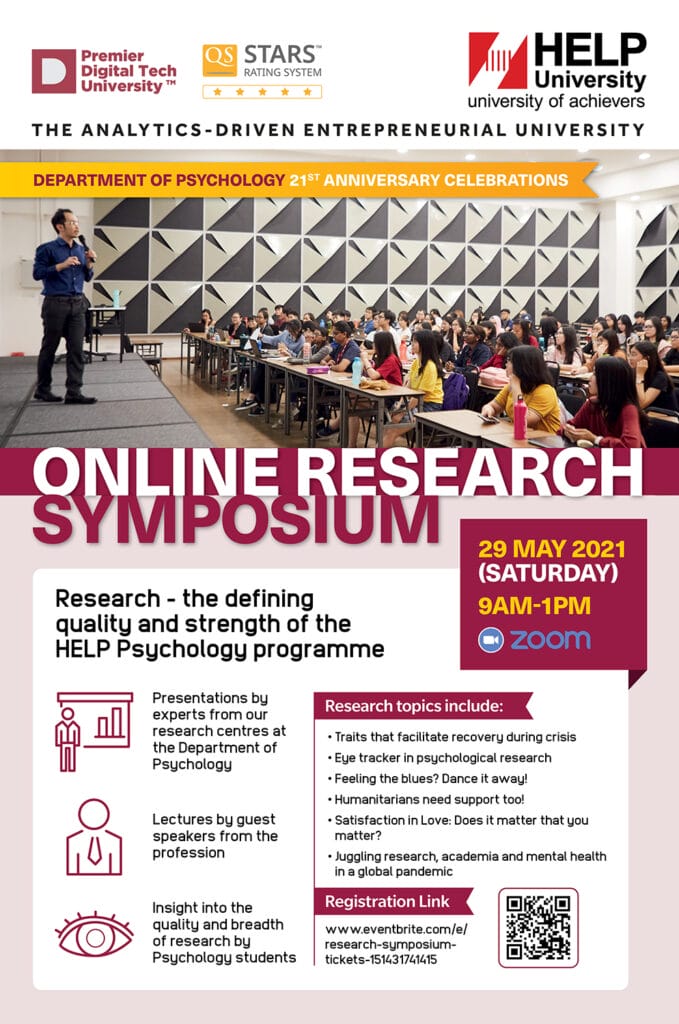Miss Tan Jie Nie is a recent graduate of HELP Univesity’s Psychology Programme and in this symposium, she presented her thesis presentation on the topic of Parental Burnout. She posed a question to the audience on what comes to mind when one talks about burnout. Participants were encouraged to think about the question and to either post their answer on the chat section during the presentation.
She explained that she first read and heard about burnout that her Pscyhology class and went on to clarfiy that burnout meant exhaustion. “This term burnout” said Miss Tan, “Is frequently discussed in the fields of industrial organisation psychology where organisations often look at how they can prevent job burnout among employees. She then pointed out that she too suffered from the effects of job burnout while internning at a center for children with special needs. ‘Being on autopilot,” pointed out Miss Tan,’caused me to further investigate and understand what burnout really means plus what causes it.’

In her presentaion, she explained that parenal burnout is the condition characterised by intense exhaustion in which parents become emotionally distant and doubtful about their parenting skills in being good parents. Burnout is not just ordinary parenting stress, rather it is a burnout due to chroni and prolong parenting stress. ‘The first and most noticeable symptom is exhaustion,’ said Miss Tan. ‘The parent feel exhausted to the point that merely thinking about their role as a parent makes them feel exhausted.
‘ Parents can also expressed being fed-up as their role as being parents and will detach themselves emotionally from their children like only providing basic care for them and nothing more and will exhibit contrasting parenting styles as compared to the idealized parents they wanted to or used to be.’
These feelings of distancing can further be expounded into stages of parental neglect, violent behaviours and even child abuse. Parental burnout occurs when there is a chronic imbalance between parenting related demands and the availability of resources to overcome these demands. Miss Tan’s main focus of her presentation focuses on parents whom have children with special education needs or SEN as she refers to it her talk. Children with SEN require more care and support as opposed to normally developed children which places higher demands and challenges on the parents.
Some of these chllenges, said Miss Tan, excessive caregiving burdens, financial strains and difficulty in balancing between work and childcare. The negative outcomes from these challenges are poor physical health, higher levels of paretnal stress, anxiety and depression. To counter parental burnout, Miss Tan, suggests that parents use mindful parenting as a resource. This resource includes the parents paying present-focused, non-judgemental attention while remaining non-reactive towards their daily parenting experiencies. Parents must listen attentively and accept themeselves and their children uncondtionally by being compassionate and emotionally aware. But people will ask, how does mindful parenting influence parenting stress?
In her presentation, Miss Jie Ni showed that there is a need for stress appraisal to determine the factors such as whether or not there are challenges and threats faced by parents. Mindful parents does help to lower stress in parental burnout and according to her findings and study, consistent mindful parentin does help lower parental burnout, especially parents with children or SEN. Hence, there is a need to develop pscyhoeducation along with parental burnout programmes that can teach parents to practice mindful parenting. The presentation ended with Miss Jie posting several key takeaways which are to always keep your parenting stress at bay, to learn how to breathe and research on more resources on mindful parenting.
HELP University is proud to offer distinct pathways to attain a degree in Psychology. The primary pathway we offer is the Bachelor of Psychology (Honours) Programme, which can be completed fully at HELP University. Students, if they so choose, may also transfer credits to affiliated universities.
For more info on the Bachelor of Psychology (Hons) degree programme, visit university.help.edu.my or call 03-2716 2000 to speak to our guidance counselor.
